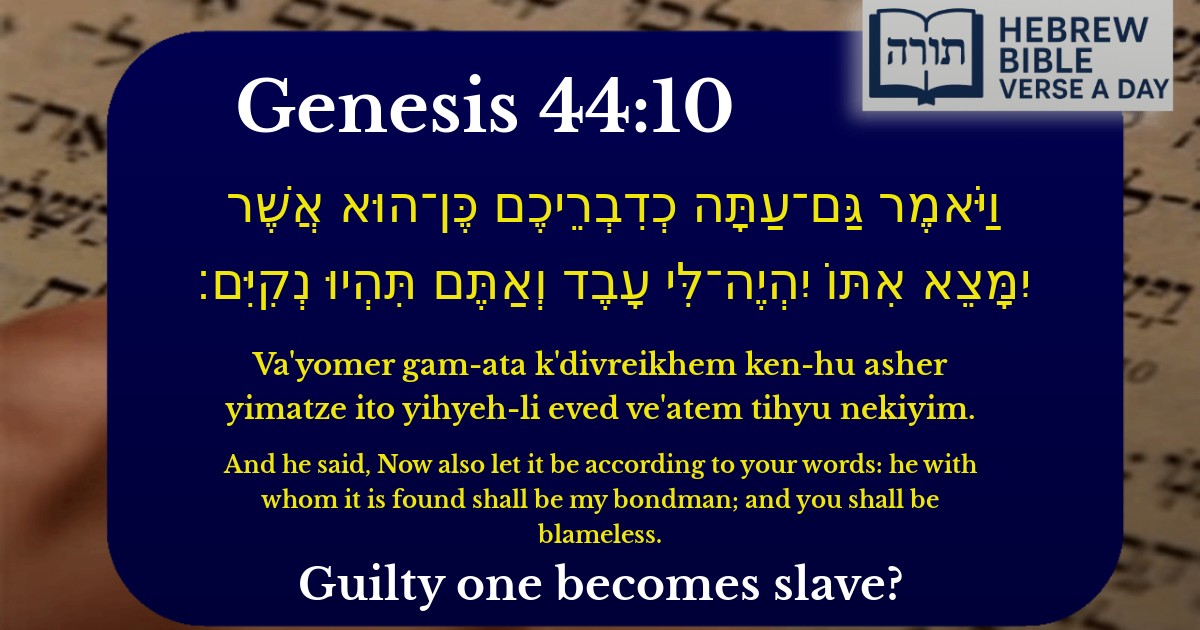Join Our Newsletter To Be Informed When New Videos Are Posted
Join the thousands of fellow Studends who rely on our videos to learn how to read the bible in Hebrew for free!
Hebrew Text
וַיֹּאמֶר גַּם־עַתָּה כְדִבְרֵיכֶם כֶּן־הוּא אֲשֶׁר יִמָּצֵא אִתּוֹ יִהְיֶה־לִּי עָבֶד וְאַתֶּם תִּהְיוּ נְקִיִּם׃
English Translation
And he said, Now also let it be according to your words: he with whom it is found shall be my bondman; and you shall be blameless.
Transliteration
Va'yomer gam-ata k'divreikhem ken-hu asher yimatze ito yihyeh-li eved ve'atem tihyu nekiyim.
Hebrew Leining Text
וַיֹּ֕אמֶר גַּם־עַתָּ֥ה כְדִבְרֵיכֶ֖ם כֶּן־ה֑וּא אֲשֶׁ֨ר יִמָּצֵ֤א אִתּוֹ֙ יִהְיֶה־לִּ֣י עָ֔בֶד וְאַתֶּ֖ם תִּהְי֥וּ נְקִיִּֽם׃
וַיֹּ֕אמֶר גַּם־עַתָּ֥ה כְדִבְרֵיכֶ֖ם כֶּן־ה֑וּא אֲשֶׁ֨ר יִמָּצֵ֤א אִתּוֹ֙ יִהְיֶה־לִּ֣י עָ֔בֶד וְאַתֶּ֖ם תִּהְי֥וּ נְקִיִּֽם׃
🎵 Listen to leining
Parasha Commentary
📚 Talmud Citations
This verse is quoted in the Talmud.
📖 Sotah 10b
The verse is referenced in the context of discussing the character of Judah and his leadership qualities, particularly in relation to his promise to his father Jacob regarding Benjamin.


Context of the Verse
This verse (Bereshit 44:10) is part of the narrative where Yosef (Joseph) tests his brothers by having his silver goblet placed in Binyamin's (Benjamin's) sack. Yosef's steward then accuses the brothers of theft, leading to this declaration. The brothers, unaware of Yosef's identity, agree to the terms: whoever is found with the goblet will become a slave, while the others will be exonerated.
Rashi's Commentary
Rashi explains that Yosef's phrasing, "כֶּן־הוּא" ("so it shall be"), indicates his acceptance of their proposed judgment. The brothers had previously suggested (Bereshit 44:9) that the guilty party should die, but Yosef modifies their harsh decree to enslavement instead. Rashi notes that this reflects Yosef's mercy, as he did not seek their destruction but rather wished to test their unity and repentance for selling him into slavery years earlier.
Rambam's Perspective on Justice
Rambam (Hilchot Sanhedrin 20:4) discusses the principles of fair judgment, emphasizing that a judge must weigh the severity of a punishment relative to the crime. Yosef's adjustment of the brothers' proposal aligns with this principle—replacing a death penalty with servitude demonstrates a measured response to the alleged theft.
Midrashic Insights
Theological Implications
The verse underscores the theme of divine providence (hashgacha pratit). Yosef's actions, though seemingly punitive, were orchestrated to bring about reconciliation and fulfill Hashem's plan for the family's descent to Egypt (Bereshit 15:13). The brothers' declaration of innocence ("נְקִיִּם") later proves ironic, as their past guilt regarding Yosef is brought to light, leading to their ultimate repentance.